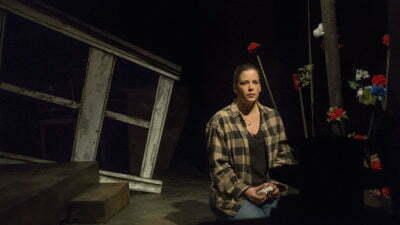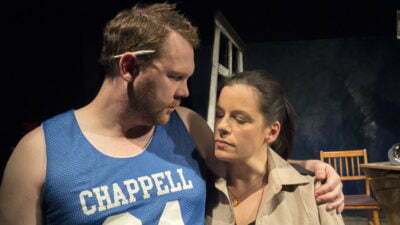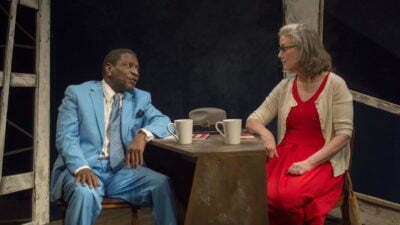Ghost Gardens
Directed by Ilesa Duncan
Produced by Pegasus Theatre Chicago
At Chicago Dramatists
Improbable premise dulls community drama
Set in suburban Detroit, Steven Simoncic’s world premiere drama, Ghost Gardens isn’t ready for the stage.
This eerie drama finds Lorelle doing her now-ten year grieving for Hope, her infant who died of cancer. Childless for the last ten years, she and her mate, Tryg (Chris Cinereski) grow apart since Lorelle can’t conceive. Add a cancer-stricken Helen (Gilmary Doyle), Lorelle’s mother and Myra (Anna Maldonado), Lorelle’s friend and former pole dancer now a nurse and we have a sad group living out life’s struggles. Eventually, we learn that this is a dying-on-the-vine community that is a poor, neglected place where cancer and infertility run rampant. The residents speak about how many pills they take. No mention is given as to why the local government or the citizens don’t protest to the EPA or to the CDC rather than being resigned to their cancer fate?
This flawed premise never considers why the folks here just don’t move away to a community where the industrial plant doesn’t spreading cancer and cause infertility? No compelling reason is offer making them stay. Tryg is getting his hours cut leading to him being laid off. Lorelle is only a security guard, so why stay in a economically depressed community? Especially, one that probably gave your dying mother cancer and will probably do that for you as it did for you infant. There folks are not trees – they can move. Why are they trapped here? But then Steven Simoncic wouldn’t have a story.
This preposterous play gets even more improbable. We meet Powder (Willie Goodson), a self-anointed baptist minister who is more of a shaman than preacher. It seems that 30 years ago, upon losing his job at the plant, her tried to be a pimp. But after failing at that, his lifelong penance forced him to be a preacher doing God’s work. He takes on Lonnie (Nathaniel Andrew) , felony parole who must work to stay out of prison. Powder mentors him with a combination of tough love, wisdom, and down-home morality.
This get even stranger when Lorelle wonders into Powder’s church despite her knowing that the church is black baptist, Ha? She tells Powder she her the fine singing. With all the racial tensions in Detroit (and most large cities), a white woman (raised a Catholic) would probably not wonder into, then become a member of a black church. Even Powder is amazed and instructs his congregation to welcome her.
So we have these incredible plot twists to deal with then another one emerges: Lorelle is now pregnant. She is the first one in the community in five years? She is troubled by this ‘miracle’ as the congregation and Lonnie’s online social media efforts, Lorelle becomes a ‘cult hero.’
We also see how Helen is dying from the local pollution. We witness Powder trying to have an interracial date with Helen. Why?
We also see Tryg turn into a distant, ant-social, unhappy person because being now unemployed, he realizes that he can’t provide her his family.
Eventually,this play turns into a community homily where everyone. led by Powder, comes together to help one and other. That is just one too many plot and character cliches for one play.
It seems that this work is structured from a “How to write a play” manual. The plot twists are so incredible that they defy belief leaving us not caring about any of the characters. Why they don’t leave such a horrible area is never addressed. Simoncic needs to re-think this piece.
Not Recommended
Tom Williams
Talk Theatre in Chicago podcast
For more info checkout the Ghost Gardens page at theatreinchicago.com
At Chicago Dramatists, 1105 W. Chicago, IL




